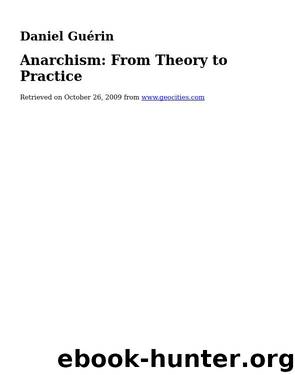Anarchism: From Theory to Practice by Daniel Guérin

Author:Daniel Guérin
Language: eng
Format: epub
A Libertarian Revolution
The point of departure of the Revolution of 1917 was that of 1905, during which a new kind of revolutionary organ had come into being: the soviets. They were born in the factories of St. Petersburg during a spontaneous general strike. In the almost complete absence of a trade-union movement and tradition, the soviets filled a vacuum by coordinating the struggle of the factories on strike. The anarchist Voline was one of the small group which had the idea of setting up the first soviet, in close liaison with the workers and at their suggestion. His evidence coincides with that of Trotsky, who became president of the soviet a few months later. In his account of 1905 he wrote, without any pejorative intent — quite the contrary: “The activity of the soviet represented the organization of anarchy. Its existence and its subsequent development marked the consolidation of anarchy.”
This experience had made a permanent mark upon working-class consciousness and, when the second Russian Revolution broke out in February 1917, its leaders did not have to invent anything. The workers took over the factories spontaneously. The soviets revived on their own initiative. Once again, they took the professional revolutionaries by surprise. On Lenin’s own admission, the masses of peasants and workers were “a hundred times further to the left” than the Bolsheviks. The prestige of the soviets was such that it was only in their name and at their behest that the October insurrection could be launched.
In spite of their vigor, however, they were lacking in homogeneity, revolutionary experience, and ideological preparation. This made them easy prey to political parties with uncertain revolutionary ideas. Although it was a minority organization, the Bolshevik Party was the only really organized revolutionary force which knew where it was going. It had no rivals on the extreme left in either the political or the trade-union field. It had first-class cadres at its disposal, and set in motion, as Voline admitted, “a feverish, overwhelming, fierce activity.”
The party machine, however — of which Stalin was at that time an obscure ornament — had always regarded the soviets with suspicion as embarrassing competitors. Immediately after the seizure of power, the spontaneous and irresistible tendency toward the socialization of production was, at first, channeled through workers’ control. A decree of November 14, 1917, legalized the participation of workers in the management of enterprises and the fixing of prices; it abolished trade secrets, and compelled the employers to publish their correspondence and their accounts. According to Victor Serge, “the leaders of the Revolution did not intend to go beyond this.” In April 1918 they “still intended... to set up mixed companies with shares, in which the Soviet State and Russian and foreign capital would all participate.” “The initiative for measures of expropriation came from the masses and not from authority.”
As early as October 20, 1917, at the first Congress of Factory Councils, a motion inspired by anarchism was presented. It proposed “control over production, and that control commissions should not be simply investigative bodies, but.
Download
This site does not store any files on its server. We only index and link to content provided by other sites. Please contact the content providers to delete copyright contents if any and email us, we'll remove relevant links or contents immediately.
| Anthropology | Archaeology |
| Philosophy | Politics & Government |
| Social Sciences | Sociology |
| Women's Studies |
The Secret History by Donna Tartt(18803)
The Social Justice Warrior Handbook by Lisa De Pasquale(12125)
Thirteen Reasons Why by Jay Asher(8765)
This Is How You Lose Her by Junot Diaz(6757)
Weapons of Math Destruction by Cathy O'Neil(6116)
Zero to One by Peter Thiel(5657)
Beartown by Fredrik Backman(5574)
The Myth of the Strong Leader by Archie Brown(5400)
The Fire Next Time by James Baldwin(5221)
How Democracies Die by Steven Levitsky & Daniel Ziblatt(5110)
Promise Me, Dad by Joe Biden(5074)
Stone's Rules by Roger Stone(5011)
100 Deadly Skills by Clint Emerson(4821)
A Higher Loyalty: Truth, Lies, and Leadership by James Comey(4820)
Rise and Kill First by Ronen Bergman(4680)
Secrecy World by Jake Bernstein(4616)
The David Icke Guide to the Global Conspiracy (and how to end it) by David Icke(4602)
The Farm by Tom Rob Smith(4419)
The Doomsday Machine by Daniel Ellsberg(4395)
